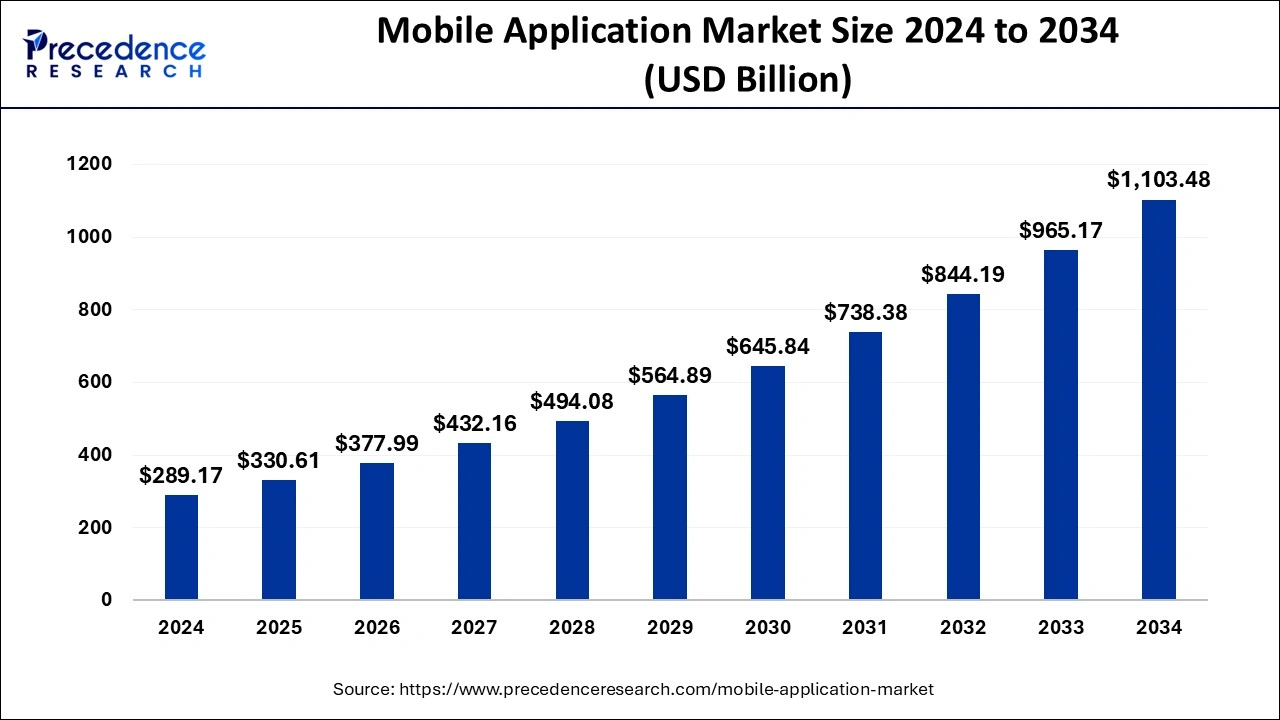The global mobile application market is set to grow from USD 330.61 billion in 2024 to USD 1,103.48 billion by 2034, expanding at a CAGR of 14.33% from 2025 to 2034.
Mobile Application Market Key Takeaways
- Asia Pacific led the global mobile application market with a 33% share in 2024.
- The Apple App Store dominated the marketplace segment, accounting for 63% of the market share in 2024.
- Gaming apps remained the top category, securing a 41% market share in 2024
Overview
Enterprise mobile applications are designed to streamline business processes, enhance productivity, and facilitate seamless communication within organizations. These applications enable employees to access company resources and perform tasks remotely, reflecting the modern shift towards digital and flexible work environments.
Drivers
Several factors contribute to the robust growth of the mobile application market. The widespread adoption of smartphones and increased internet penetration, especially in emerging economies, have expanded the user base for mobile applications. Affordable data plans and improved network infrastructure have made mobile internet more accessible, encouraging the download and use of various apps. Additionally, the integration of advanced technologies such as artificial intelligence (AI), machine learning (ML), and cloud computing has enhanced app functionalities, providing personalized and efficient user experiences. The COVID-19 pandemic also accelerated the demand for mobile applications in sectors like e-commerce, healthcare, and education, as consumers sought remote solutions for shopping, medical consultations, and learning.
Opportunities
The evolving technological landscape presents numerous opportunities within the mobile application market. The rise of the Internet of Things (IoT) has paved the way for apps that control and monitor smart devices, catering to the growing smart home market. The increasing focus on health and wellness has led to a surge in fitness and mental health apps, offering users accessible tools for personal well-being. Moreover, the expansion of mobile payment solutions and digital wallets aligns with the global shift towards cashless economies, providing secure and convenient transaction methods. The continuous development of augmented reality (AR) and virtual reality (VR) technologies also offers innovative possibilities for gaming, education, and retail applications, creating immersive user experiences.
Challenges
Despite the promising growth, the mobile application market faces several challenges. The diversity of devices and operating systems necessitates extensive testing and optimization to ensure compatibility and performance across platforms. Security concerns are paramount, as apps often handle sensitive user data, requiring robust measures to prevent breaches and maintain user trust. The market’s competitiveness makes user acquisition and retention increasingly difficult, with millions of apps vying for attention in app stores. Additionally, the rapid pace of technological change demands continuous updates and innovation, posing resource and development challenges for app creators.
Regional Insights
North America leads the enterprise mobile application market, driven by technological innovation and a high concentration of businesses adopting digital solutions. Europe follows suit, with a strong emphasis on data protection and regulatory compliance influencing application development. The Asia-Pacific region is witnessing rapid growth, attributed to expanding industrialization and a burgeoning IT sector, particularly in countries like India and China.
Recent News
In recent developments, the African mobile gaming industry has gained international attention. Studios like Kiro’o Games from Cameroon and Maliyo Games from Nigeria are creating culturally relevant games tailored to the African market. Kiro’o Games’ latest project, “The Elite of Mboa,” is a social parody game reflecting African political themes, while Maliyo Games has partnered with Disney to develop a mobile game based on the Afro-futuristic animated series “Iwaju.” These initiatives aim to capture the rapidly growing number of gamers on the continent, with the African gaming population increasing from 77 million in 2015 to 186 million in 2021.
Ready for more? Dive into the full experience on our website!
https://www.precedenceresearch.com/
